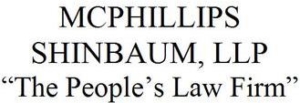Returning to work too soon after sustaining a personal injury can have significant implications on your personal injury claim. While it may seem necessary to resume work as soon as possible for financial reasons, doing so too early could potentially damage your claim and limit your chances of receiving fair compensation for your injuries. This seems unfair—people often have to go back to work to provide for their families, but in doing so, they prevent themselves from receiving the full and fair compensation they deserve.
It’s important to run important decisions like this one by your personal injury attorney as soon as possible. At McPhillips Shinbaum, attorney Aaron Luck helps injured clients pursue the compensation they are owed. Set up your consultation with attorney Aaron Luck now by calling us at 334-262-1911.
How Your Work Status Affects Your Personal Injury Claim
Your work status plays a crucial role in your personal injury claim, as it directly impacts the amount of compensation you receive and your efforts to mitigate your injuries. When determining compensation for your injuries, insurance companies and courts consider factors such as lost wages, diminished earning capacity, and the impact of the injury on your ability to perform job-related tasks. Your work status, including whether you are able to return to work, the extent of your work restrictions, and any accommodations needed, plays a big role in the compensation you receive. If you push yourself to return to work early—even if doing so negatively impacts your health—the insurance company may claim that your injuries obviously aren’t as bad as reported.
Dangers of Returning to Work Early
Returning to work earlier than recommended after sustaining a personal injury can pose several risks to your claim:
- Underestimation of damages: By returning to work before you fully recover from your injuries, you may underestimate the severity of your condition and the long-term impact it may have on your ability to work and earn income. This could result in undervaluing your claim and receiving inadequate compensation for your losses. You may, for example, be able to push through your work for a few weeks—only to collapse four weeks in and be permanently out of the workforce.
- Compromised medical treatment: Returning to work too soon may interfere with your medical treatment and rehabilitation process. Focusing on work responsibilities instead of prioritizing your recovery could delay or hinder your progress, leading to prolonged pain and suffering and potentially exacerbating your injuries. Remember, part of your responsibility in a personal injury claim is to put appropriate effort into your recovery.
- Limited documentation: Continuing to work while still experiencing pain or limitations may result in insufficient documentation of your injuries and their impact on your ability to work. It’s likely that the other party will assume your injuries are less severe than reported.
Going Back to Work Could Endanger Your Claim
Returning to work too early could also jeopardize your claim by providing ammunition for the defense to dispute the validity of your claim. Insurance companies will point at your past descriptions of your injuries, and then ask how those reports can be true if you’re back to work already. Not only could your claim lose value, but it could be lost entirely if the insurance company is convincing enough.
How Long After a Work Accident Can You Claim in Montgomery, AL?
Experiencing a work-related injury can be a stressful and confusing time, especially when you’re trying to navigate the legal and medical aspects of recovery.
If you’ve been injured on the job in Montgomery, Alabama, understanding the deadlines for filing a workers’ compensation claim is essential.
These time limits, known as statutes of limitations, are strict, and missing them can mean losing your right to receive benefits. This guide will walk you through the essential timelines and steps you need to take.
Understanding Workers’ Compensation in Alabama
Workers’ compensation is a system designed to provide medical treatment, wage replacement, and other benefits to employees who are injured or become ill as a direct result of their job duties. In Alabama, most employers are required to carry workers’ compensation insurance. This system is intended to be a “no-fault” system, meaning that benefits are generally paid regardless of who was at fault for the accident, as long as the injury occurred within the scope of employment.
The primary goal of workers’ compensation is to ensure that injured workers receive the care and financial support they need without having to prove fault in a lengthy lawsuit. However, to access these benefits, you must follow specific procedures and adhere to strict deadlines.
The Statute of Limitations: Your Deadline
The most important thing to understand about claiming workers’ compensation in Montgomery, AL, is that there are two primary deadlines you must meet: one for notifying your employer and another for formally filing a claim with the court.
1. Notice to Your Employer: The Initial Steps
The very first step after a work injury is to notify your employer. Alabama law has specific requirements for this:
- Immediate Notification (Ideally within 5 Days): While not a strict legal deadline for the claim itself, it is highly recommended and often required by company policy to report your injury to your employer as soon as possible, ideally within five days of the accident. This immediate notification helps establish that the injury is work-related and can prevent disputes later on. Many employers have specific procedures for reporting injuries, so be sure to follow them.
- 90-Day Written Notice Requirement: Alabama law generally requires that you provide written notice of your injury to your employer within 90 days of the accident. While verbal notice is often accepted initially, a written record is much stronger evidence. This written notice should include the time, place, nature, and cause of the injury, as well as the name and address of the injured employee. Failing to provide this written notice within 90 days can jeopardize your claim unless you can show a “reasonable excuse” for the delay and that the employer was not prejudiced by it. It’s always best to err on the side of caution and provide written notice promptly.
2. Filing a Formal Claim: The Legal Deadline
Even after notifying your employer and receiving some benefits, there’s a separate and critical deadline for filing a formal claim with the court if your benefits are denied, disputed, or stopped. This is the official statute of limitations for workers’ compensation claims in Alabama:
- Two Years from the Date of Accident: Generally, you have two years from the date of the accident to file a formal Petition for Workers’ Compensation with the court. If you do not file this petition within this two-year period, you will likely lose your right to pursue workers’ compensation benefits, regardless of the severity of your injury.
- Two Years from the Date of Last Payment: There’s an important exception to the two-year rule. If your employer or their insurance company has paid you any workers’ compensation benefits (such as medical bills or temporary disability payments), the two-year clock for filing a formal claim restarts from the date of the last payment of benefits. This means that if you were receiving benefits and they suddenly stop, you have two years from that last payment date to file a petition. This provision is particularly important for injuries that require ongoing medical care or those where benefits are terminated prematurely.
Exceptions to the Rule
While the two-year statute of limitations is generally firm, there are limited exceptions:
- Latent Injuries/Occupational Diseases: For injuries or diseases that develop over time and are not immediately apparent (e.g., carpal tunnel syndrome, lung disease from exposure to chemicals), the two-year period may begin when you discover or should have reasonably discovered that your injury or illness is work-related. This can be a complex area, and legal guidance is often necessary.
- Minors: If the injured employee is a minor, the statute of limitations may not begin to run until they reach the age of majority (19 in Alabama).
Why Timely Reporting is Paramount
Beyond the legal deadlines, there are practical reasons why reporting your work accident immediately is essential:
- Preserving Evidence: The sooner you report, the easier it is to gather evidence, such as witness statements, surveillance footage, and details about the accident scene, before they are lost or forgotten.
- Facilitating Medical Treatment: Prompt reporting allows your employer and their insurance carrier to authorize necessary medical treatment quickly, which is vital for your recovery and for documenting the extent of your injuries.
- Avoiding Disputes: Delays in reporting can lead the employer or insurer to question whether the injury actually happened at work or if it’s as severe as claimed. Timely reporting minimizes these doubts.
Steps to Take After a Work Accident in Montgomery, AL
If you’ve been injured at work, follow these steps to protect your rights:
- Seek Immediate Medical Attention: Your health is the priority. Get medical help right away, even if you think your injury is minor. Be sure to tell the medical professionals that your injury is work-related.
- Notify Your Employer: Report the accident to your supervisor or the designated person (e.g., HR department) as soon as possible. Follow their internal reporting procedures. Make sure to get confirmation of your report, preferably in writing.
- Document Everything: Keep detailed records of everything related to your injury:
- The date, time, and specific details of the accident.
- Names of witnesses.
- Copies of any accident reports you fill out.
- All medical records, doctor’s notes, and bills.
- Records of all communications with your employer, their insurance company, and medical providers.
- Consult with a Workers’ Compensation Attorney: This is perhaps the most important step. A workers’ compensation attorney in Montgomery, AL, can help you understand your rights, ensure you meet all deadlines, gather necessary evidence, communicate with the employer and insurance company, and fight for the benefits you deserve. They can also help navigate the complexities of denied claims or disputes.
What if Your Claim is Denied?
It’s not uncommon for initial workers’ compensation claims to be denied. This can happen for various reasons, such as disputes over whether the injury was work-related, the extent of the injury, or a failure to follow reporting procedures. If your claim is denied, it becomes even more critical to have legal representation. An attorney can help you appeal the denial, present your case effectively, and represent you in any necessary hearings or court proceedings.
The Role of a Workers’ Compensation Attorney
While you can attempt to handle a workers’ compensation claim on your own, the process can be complex, especially when dealing with insurance companies that may try to minimize payouts. A workers’ compensation attorney can:
- Explain your rights and the specific laws applicable in Alabama.
- Ensure all forms are filed correctly and on time.
- Communicate with the employer and insurance company on your behalf.
- Help you obtain necessary medical treatment and documentation.
- Negotiate a fair settlement.
- Represent you in court if your claim is denied or disputed.
The time limits for claiming workers’ compensation benefits after a work accident in Montgomery, AL, are strict and unforgiving.
You generally have 90 days to provide written notice to your employer and two years from the date of the accident (or last payment of benefits) to file a formal claim with the court. Missing these deadlines can result in the permanent loss of your right to benefits.
To protect your health and financial future, always report your injury immediately, document everything, and seriously consider consulting with a qualified workers’ compensation attorney as soon as possible. Acting quickly and decisively is your best strategy for a successful claim.
How to Protect Your Case
Protecting your health and your personal injury claim should be two of your top priorities during this process. Luckily, the two go hand-in-hand. First, follow the treatment and care recommendations given by your doctor. This means not returning to work until you are given the all-clear, doing all recommended physical therapy exercises, and taking medication as prescribed. Second, document your progress and setbacks. If your injury prevents you from taking care of your home and family, following your care instructions, or otherwise living your daily life, make note of these limitations.
Explore Your Legal Options with McPhillips Shinbaum
When you’re ready to move forward with your personal injury claim, attorney Aaron Luck is here to help you fight for the compensation you deserve. Let’s sit down and talk about your next steps. Just call us at 334-262-1911 or send us a message online to get started.



 Lost Wages in Personal Injury Claims
Lost Wages in Personal Injury Claims












